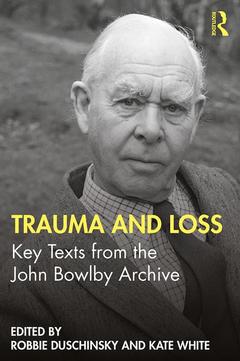Trauma and Loss Key Texts from the John Bowlby Archive
Coordonnateurs : Duschinsky Robbie, White Kate

During his lifetime John Bowlby, the founder of attachment theory, was unable to publish as he wished due to strong opposition to his ideas. Now, with the support of the Bowlby family, several complete and near-complete works from the John Bowlby Archive at the Wellcome Collection are published for the first time.
The collection spans Bowlby?s thinking from his early ideas to later reflections, and is split into four parts. Part 1 includes essays on the topic of loss, mourning and depression, outlining his thoughts on the role of defence mechanisms. Part 2 covers Bowlby?s ideas around anxiety, guilt and identification, including reflections on his observations of and work with evacuated children. Part 3 features three seminars on the subject of conflict, in which Bowlby relates clinical concepts to both political philosophy and psychoanalysis in innovative ways. Part 4 consists of Bowlby?s later reflections on trauma and loss, and on his own work as a therapist.
This remarkable collection not only clarifies Bowlby?s relationship with psychoanalysis but features his elaboration of key concepts in attachment theory and important moments of self-criticism.
It will be essential reading for clinicians, researchers, and others interested in human development, relationships and adversity.
List of illustrations
Acknowledgements
Foreword: Miriam Steele and Howard Steele
Introduction: Robbie Duschinsky and Kate White
Part One: Mature theoretical writings
1. Defences that Follow Loss: Causation and Function (1962); Appendix: Selective Exclusion & Levels of Motivation (c.1960-1963)
2. Loss, Detachment and Defence (1962); Appendix: Letter from Mary Ainsworth (1962)
3. The Place of Defensive Exclusion in Depressive Disorders (c.1978-1979)
4. Darwin: Psychiatry and Developmental Psychology (1983)
Part Two: Early writings on guilt, anxiety and identification
5. Psychological Problems of Evacuation (c.1939-1942)
6. Freud and the Super-Ego (c.1933-1936)
7. Guilt and Family Contracts (c.1937-1939)
Part Three: Seminars at Stanford and the Tavistock
8. A Psycho-Analytic Approach to Conflict and its Regulation: A seminar delivered to members of the Stanford Conflict Seminar (1958)
9. Summary of Discussions and Topics for Final Session(s): A seminar delivered to members of the Stanford Conflict Seminar, February, 1958
10. Psychological Processes Evoked By A Major Psycho-Social Transition (1974); Appendix: Transitions by Colin Murray Parkes (1974)
Part Four: Retrospective reflections
11. Interview with Alice Smuts (1977)
12. The Role of the Psychotherapist’s Personal Resources in the Treatment Situation (1985)
Index
Robbie Duschinsky is Senior University Lecturer in Social Sciences in the Primary Care Unit, University of Cambridge. He is also a Fellow and Director of Studies at Sidney Sussex College.
Kate White is an attachment-based psychoanalytic psychotherapist, supervisor and member of The Bowlby Centre, London. She is also Editor Emeritus for Attachment: New Directions in Psychotherapy and Relational Psychoanalysis and is currently Series Editor for The Bowlby Centre Monographs and most recently co-editor of Dementia: An Attachment Approach.
Date de parution : 10-2019
15.6x23.4 cm
Disponible chez l'éditeur (délai d'approvisionnement : 14 jours).
Prix indicatif 27,70 €
Ajouter au panierDate de parution : 10-2019
15.6x23.4 cm
Disponible chez l'éditeur (délai d'approvisionnement : 14 jours).
Prix indicatif 160,25 €
Ajouter au panierThème de Trauma and Loss :
Mots-clés :
Young Man; bowlby; Girl Friend; loss; Animal Kingdom; trauma; University College Hospital Medical School; freud; War Time; tavistock; Human Suffering; child psychology; Friday 10th January; pediatric; Oral Incorporation; traumatic loss; Large Family; depression; London Child Guidance Clinic; John Bowlby archive; Defensive Processes; trauma theory; Eric Trist; psychoanalysis; Wellcome Collection; Selective Exclusion; Primary Repression; Pathological Mourning; Secondary Repression; Infantile Theories; Darwin’s Study; Detached Behaviour; Ect; Intra-psychic Conflict; British Psychoanalytical Society



